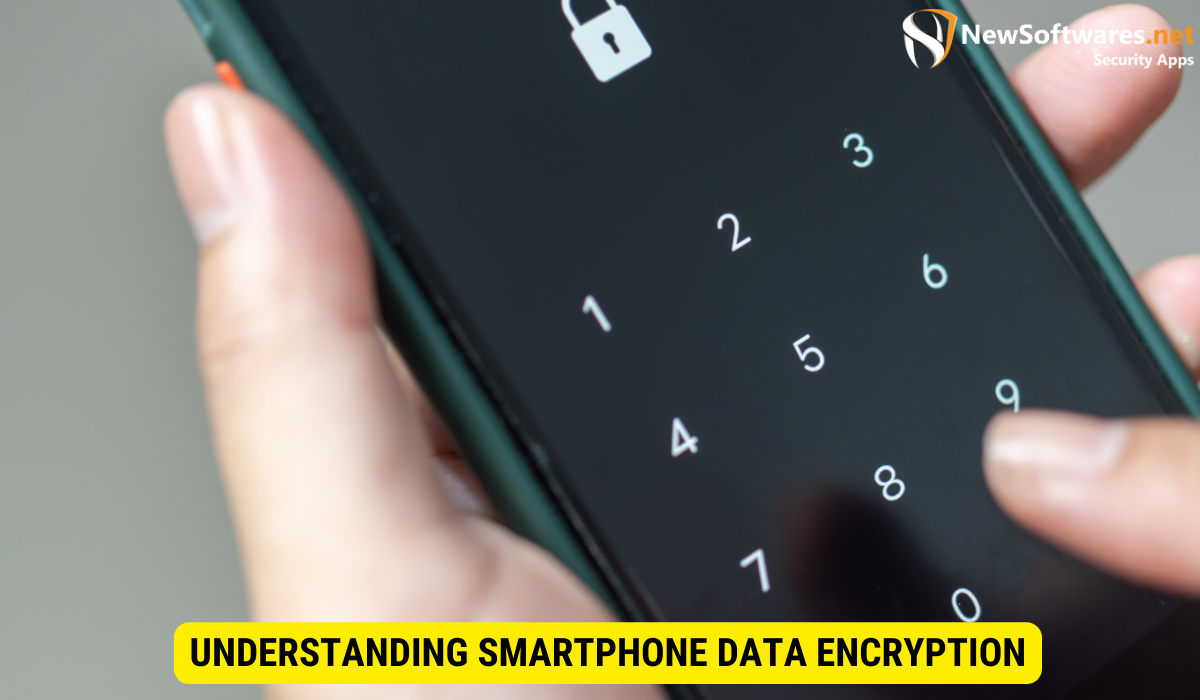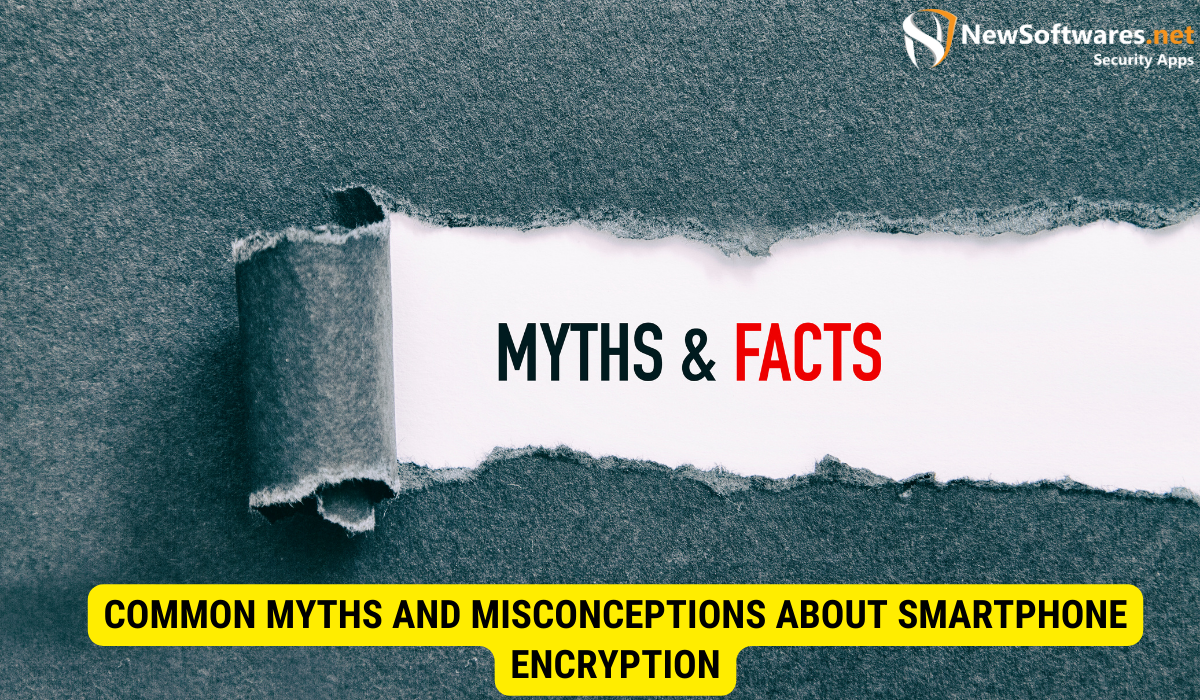Yes, the data on your smartphone should be encrypted. Smartphone data encryption is a crucial security measure in today’s digital age, where smartphones store a vast amount of personal and sensitive information. Encryption transforms your data into an unreadable format, protecting it from unauthorized access, data breaches, and potential threats. It adds an extra layer of security, ensuring that even if your device is lost or stolen, your personal information remains confidential. To encrypt your smartphone data, follow the specific steps outlined in your device’s settings, and consider the advantages and potential minor impact on device performance. Encryption is a proactive and essential step to safeguard your digital life and maintain control over your personal information.
In today’s digital age, our smartphones have become an integral part of our lives. They store a vast amount of personal information, from sensitive photos to financial data. With the increasing prevalence of cybersecurity threats, the question arises: should the data on your smartphone be encrypted? Together, we will explore the concept of smartphone data encryption, its importance, the pros and cons, how to encrypt data on different smartphone platforms, and debunk some common myths and misconceptions.
Understanding Smartphone Data Encryption

Before we delve into whether smartphone data should be encrypted, let’s first understand what data encryption entails. Data encryption is the process of encoding information in such a way that it becomes unintelligible to unauthorized individuals. It is a security measure that safeguards our data from potential threats.
Data encryption involves converting plain text into ciphertext using complex mathematical algorithms. The ciphertext can only be decrypted with the correct encryption key, ensuring that only authorized individuals can access the information.
But how does smartphone encryption work? Let’s explore further.
What is Data Encryption?
Data encryption is a fundamental concept in the world of cybersecurity. It involves the transformation of data into a format that is unreadable to anyone without the proper decryption key. This process ensures that sensitive information, such as personal data, financial records, and confidential documents, remains secure even if it falls into the wrong hands.
There are various encryption algorithms used in data encryption, including Advanced Encryption Standard (AES), Rivest-Shamir-Adleman (RSA), and Data Encryption Standard (DES). These algorithms use complex mathematical calculations to scramble the data, making it virtually impossible for unauthorized individuals to decipher.
When it comes to smartphone data encryption, the encryption process occurs at the device level. This means that the data stored on the smartphone is encrypted, providing an additional layer of protection against unauthorized access.
How Does Smartphone Encryption Work?
Smartphone encryption works by encrypting the data stored on the device using cryptographic algorithms. When enabled, the operating system generates a unique encryption key that is stored securely on the device. This encryption key is required to access the data on the device, adding an extra layer of protection.
When you enable encryption on your smartphone, the operating system starts the encryption process by converting the data into ciphertext. This ciphertext is then stored on the device’s internal storage or external memory card, depending on the device’s configuration.
Whenever you access the encrypted data, the operating system uses the encryption key to decrypt the ciphertext and present the information in its original form. Without the encryption key, the data remains unreadable and inaccessible.
Smartphone encryption not only protects the data stored on the device but also safeguards it in the event of loss or theft. Even if someone gains physical access to the smartphone, they would need the encryption key to decrypt the data, making it extremely difficult for them to retrieve any sensitive information.
It is important to note that smartphone encryption does not protect data in transit, such as data sent over the internet or through messaging apps. For secure communication, additional encryption measures, such as end-to-end encryption, are necessary.
In conclusion, smartphone data encryption is a crucial security measure that ensures the confidentiality and integrity of our personal information. By encrypting the data stored on our smartphones, we can protect ourselves from potential threats and maintain control over our sensitive data.
The Importance of Smartphone Data Encryption
The importance of smartphone data encryption cannot be overstated. In today’s digital age, where our smartphones have become an extension of ourselves, it is crucial to protect our personal information from falling into the wrong hands. While the convenience and connectivity offered by smartphones are undeniable, they also pose a significant risk to our privacy and security.
Protecting Personal Information
Our smartphones contain a wealth of personal information, making them a treasure trove for potential identity thieves and cybercriminals. From contact details and emails to social media accounts and even banking apps, our smartphones hold a vast amount of sensitive data. If this data falls into the wrong hands, it could have serious consequences, ranging from identity theft to financial loss.
Encrypting the data on your smartphone ensures that even if it is stolen or lost, the information remains confidential and inaccessible. Encryption is like a protective shield that scrambles the data, making it unreadable without the encryption key. This means that even if someone gains unauthorized access to your device, they would not be able to decipher the encrypted data, keeping your personal information safe.
Imagine the peace of mind knowing that your private conversations, personal photos, and sensitive documents are all shielded from prying eyes. Encryption adds an extra layer of security to your smartphone, ensuring that your personal information remains just that – personal.
Preventing Data Breaches
In recent years, data breaches have become all too common, with cybercriminals targeting individuals and organizations alike. These breaches can lead to the exposure of sensitive information, resulting in significant financial and reputational damage. By encrypting the data on your smartphone, you significantly reduce the risk of data breaches.
Even if a hacker gains physical access to your device, they would still need the encryption key to decrypt the data. This makes it extremely difficult for them to extract any valuable information. Encryption acts as a strong deterrent, discouraging potential attackers from even attempting to breach your smartphone’s security.
Furthermore, encrypting your smartphone’s data not only protects your personal information but also safeguards any sensitive data related to your work or business. Many professionals and organizations rely on smartphones to store and access confidential documents, emails, and client information. Encrypting this data ensures that it remains secure, even if your device is lost or stolen.
With the increasing reliance on smartphones for both personal and professional purposes, the need for robust security measures, such as data encryption, cannot be ignored. It is an essential step in safeguarding your privacy, protecting your personal information, and preventing unauthorized access to sensitive data.
So, take the necessary precautions and enable data encryption on your smartphone today. By doing so, you can enjoy the convenience and connectivity offered by your device while ensuring that your personal information remains secure.
The Pros and Cons of Encrypting Smartphone Data
Although smartphone data encryption offers numerous benefits, it is essential to consider both the advantages and potential drawbacks before deciding to encrypt your smartphone data.
Advantages of Data Encryption
One significant advantage of encrypting smartphone data is the enhanced security it provides. It adds a layer of protection against unauthorized access and keeps your personal information confidential. Additionally, many smartphones offer built-in encryption features that are relatively easy to enable, making it a convenient option for users.
Potential Drawbacks of Data Encryption
While the benefits of data encryption are undeniable, there are some potential drawbacks to consider. Encrypting smartphone data can have a minor impact on device performance, as the encryption and decryption processes require additional computational resources. Additionally, if you forget your encryption password or lose your encryption key, it may become challenging to recover the encrypted data.
How to Encrypt Data on Different Smartphone Platforms?
Now that we understand the importance and potential drawbacks of smartphone data encryption, let’s explore how to encrypt data on different smartphone platforms:
Encrypting Data on Android Devices
If you own an Android device, you can easily encrypt the data stored on it. Simply follow these steps:
- Open the Settings on your Android device.
- Scroll down and tap on Security or Biometrics and Security.
- Select the option for Encryption or Encrypt Device.
- Follow the on-screen instructions to encrypt your device.
Encrypting Data on iOS Devices
If you are an iOS user, Apple provides seamless encryption options for your data. Here’s how you can encrypt your data on an iOS device:
- Go to the Settings app on your iOS device.
- Scroll down and tap on Touch ID & Passcode or Face ID & Passcode.
- Enter your passcode.
- Enable the option for Data Protection.
Common Myths and Misconceptions about Smartphone Encryption

There are several myths and misconceptions surrounding smartphone encryption that can muddy the waters when it comes to making an informed decision. Let’s debunk some of the most common encryption myths:
Debunking Encryption Myths
Myth #1: Encryption is only necessary for those involved in illegal activities. Fact: Encryption is crucial for everyone, regardless of their activities. It protects your personal information and helps safeguard against data breaches.
Myth #2: Encrypting smartphone data is a complex and time-consuming process. Fact: Most modern smartphones offer straightforward encryption options that can be enabled with just a few clicks. It is a simple and quick process to ensure your data is protected.
Understanding the Realities of Data Encryption
While it is essential to debunk encryption myths, it is equally important to understand the realities of data encryption:
- Data encryption adds an extra layer of security to protect your personal information.
- Encryption does not make your smartphone immune to all threats, but it significantly reduces the risk of data breaches.
- Choosing a strong encryption password or passphrase is crucial to ensure the security of your encrypted data.
Key Takeaways
- Encrypting the data on your smartphone adds an extra layer of security and protects your personal information from unauthorized access.
- Smartphone data encryption can help prevent data breaches and minimize the risk of identity theft or financial loss.
- Consider the advantages and potential drawbacks of data encryption before deciding to encrypt your smartphone data.
- Most modern smartphones provide easy-to-use encryption options that can be enabled in just a few steps.
- Debunk popular encryption myths and understand the realities of data encryption to make informed decisions.
FAQs
Is smartphone data encryption necessary for everyone?
Yes, smartphone data encryption is crucial for everyone, as it adds an extra layer of security to protect personal information from potential threats.
Can I recover encrypted data if I forget my encryption password?
It can be challenging to recover encrypted data if you forget your encryption password or lose your encryption key, emphasizing the importance of securely storing these credentials.
Does encrypting smartphone data affect device performance?
While encryption may have a minor impact on device performance, modern smartphones are designed to handle it without significant degradation.
What are the advantages of smartphone data encryption?
Smartphone data encryption enhances security, protects personal information, and reduces the risk of data breaches and identity theft.
How do I encrypt data on different smartphone platforms?
To encrypt data on Android or iOS devices, follow the simple steps provided in the article’s relevant section for your platform.
Conclusion
In today’s digital age, smartphone data encryption is not only necessary but also a proactive security measure to protect personal information from potential threats and data breaches. Understanding the importance, benefits, and potential drawbacks of encryption empowers users to make informed decisions and ensure the confidentiality of their digital lives. Stay secure, stay informed, and take steps to encrypt your smartphone data for added peace of mind.
